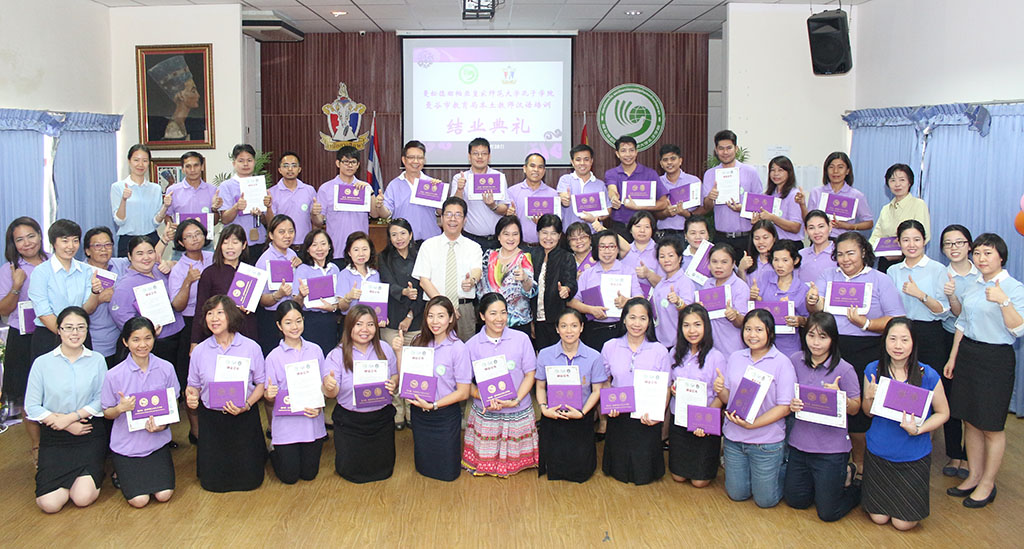在泰孔子学院助力汉语教师培训需求
新华网4月12日报道中文摘要:
曼松德孔子学院适应泰国汉语教学发展的需求,五年来,每周六下午为曼谷及曼谷周边的本土汉语教师进行3小时的培训,培训内容包括基础汉语和中国文化。每学期培训伊始,孔子学院根据教师们分班测试的水平,分成三个不同的班级进行培训,以求达到培训更具针对性。
为吸引教师们能够坚持参加培训,曼松德孔子学院在培训期间开展了很多活动。同时,为鼓励他们,每年,曼谷教育局从百余名教师中选拔出20人,赴天津师范大学进行为期一个月的学习。
曼松德大学孔子学院的本土教师培训工作得到了曼谷教育局和曼松德大学的鼎力支持,在曼松德孔子学院的推动下,曼松德大学与天津师范大学在汉语国际教育硕士专业进行合作,每年招收25名奖学金生赴天津师范大学学习,毕业后回泰国继续从事汉语教学工作。
本土教师Nantawat Radsamee 已经参加培训三年了,认为培训对他的教学工作帮助很大。本土教师Prasat Seri是一名美术老师,但是几年来一直坚持参加汉语培训,他甚至自己编写了一本适合泰国小学汉语普通话教学的图文课本,并获得了曼谷教育局的后期支持。他非常感谢曼松德孔子学院的老师帮助他校订和编辑那本书,并表示,他非常喜欢参加培训,每周都能学到新的东西。
曼谷教育局副局长Thanita Praewanich 在本学期培训结业式上,高度肯定和赞扬了曼松德孔子学院教师的敬业与奉献,并表示,五年来,曼松德孔子学院的教师培训已经惠及了曼谷周边438所学校,选拔优秀教师赴华学习已经成了他们的师资系统中的主流项目。
Confucius Institute in Thailand helps train teachers to meet growing demand for learning Mandarin
BANGKOK, April 12 (Xinhua) -- Chinese language has become more and more popular in Thailand due to the increase of Chinese tourists and China's development, which drives a Confucius Institute in Bangkok to voluntarily help train local teachers to meet the growing demand for learning Mandarin here.
On a hot Saturday afternoon recently, Mandarin teachers around Bangkok came to the Confucius Institute at Bansomdejchaopraya Rajabhat University (BSRU) to take their weekly three-hour course of Mandarin and Chinese culture, taught by teachers of the institute.
"Our teachers voluntarily use their spare time to train local teachers here every week," said Wen Xiangyu, Chinese dean of the Confucius Institute, which was established in 2006.
In Chinese teacher Song Chunzhi's class, some 20 Thai teachers were learning Chinese expressions and making new sentences under Song's instruction.
"I have been taking the course for three years, it helped me a lot," said Nantawat Radsamee, a Mandarin teacher in a primary school called Wat Ladplakao after the class.
The Confucius Institute also went to Nantawat's school and held a cultural event there to celebrate the Chinese lunar Year of the Rooster in February, which attracted many pupils to join.
Prasat Seri, an fine arts teacher, has been attending the course for several years. He even drew pictures to teach Chinese characters and made a picture book, which was later promoted by Bangkok's Department of Education as a standard textbook to teach Mandarin in all primary schools of the city.
Prasat expressed gratitude to the teachers of the Confucius Institute in helping him check and edit the picture book.
"I love the course, especially the cultural part as there are always something new every week," he said.
Besides Song's class, there were other three classes ongoing every Saturday as the Confucius Institute has put local teachers in different classes according to a language test at the beginning of every semester.
According to Wen, the Chinese dean, the Confucius Institute at the BSRU has cooperated with Bangkok's Department of Education in this training course for at least five years.
Around 1 million Thais are learning Mandarin right now, which means a lot of Mandarin teachers are needed, said Wang Wei, a teacher at the Confucius Institute.
Teachers of the Confucius Institute, originally from Tianjin Normal University of China, used their expertise in education to start the training program with Bangkok's Department of Education.
"We have thought of many activities to attract local teachers to keep coming to the classes," said Wen, and every year, 20 outstanding teachers of some 100 teachers in total get the chance to study Mandarin in Tianjin Normal University for a month with full scholarships.
She said Bangkok's Department of Education and the BSRU have given much support to the training program.
Thanita Praewanich, deputy director of Bangkok's Department of Education, praised teachers of the Confucius Institute for their expertise and devotion during a ceremony to mark the end of the training course in this semester late March.
"In five-year time, the training course here has covered 438 schools around Bangkok, and some outstanding local teachers went to China for further study, and became mainstay of our educational system," Thanita said, adding that the training program should go on.
Sutipporn Chotratanasak, Thai dean of the Confucius Institute, said the Confucius Institute even helped the BSRU to become more popular due to the training program and a postgraduate program.
Besides the training program, the Confucius Institute is working with the BSRU and Tianjin Normal University to enroll Thai students for a postgraduate program.
Every year, some 25 Thai students would choose to be in the postgraduate program and they would go to learn in Tianjin Normal University with full scholarships and come back for work, mainly as Mandarin teachers in secondary and primary schools, according to Wen.
"We have enrolled students for the program for three years, and some 94 percent of the first batch of students have found schools and the second batch is doing internship here in our institute," said Wen.
Wang believes training local teachers are very important for the Chinese-language teaching in the long term. "Thais cannot always rely on Chinese to teach them, they have to have their own Mandarin teachers."
"Some schools told us they don't need teachers with master degrees, but I think they will gradually understand a teacher with a master degree can help them improve their Chinese-language teaching significantly," Wang said.

